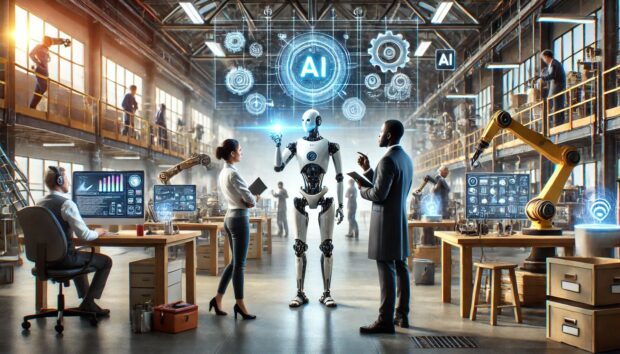
The global artificial intelligence market is expected to surge to $4.8 trillion by 2033 — a value comparable to Germany’s entire economy. However, reports indicate that artificial intelligence could impact 40 percent of jobs worldwide, raising both opportunities and concerns for workers everywhere.
While AI is driving economic transformation and opening new avenues for growth, it also poses risks of deepening existing inequalities. According to international trade and development experts, sectors relying heavily on knowledge work will face the greatest exposure to AI-driven changes, unlike prior technological waves that mostly affected blue-collar roles.
How Artificial Intelligence Could Impact 40 Percent of Jobs Worldwide
Advanced economies are expected to experience the strongest impact, as they have more knowledge-intensive industries that AI can disrupt. Yet, these countries are also better positioned to leverage AI’s benefits, unlike developing nations that rely on low-cost labor. Experts warn, “The benefits of AI-driven automation often favor capital over labor, which could widen inequality and reduce the competitive advantage of low-cost labour in developing economies.”
The chief of the overseeing agency emphasized the need to keep people at the heart of AI advancement. She urged countries to collaborate internationally to “shift the focus from technology to people, enabling countries to co-create a global artificial intelligence framework.” She further cautioned, “History has shown that while technological progress drives economic growth, it does not on its own ensure equitable income distribution or promote inclusive human development.”
Economic Growth and AI’s Expanding Market
In 2023, frontier technologies such as the internet, blockchain, 5G, 3D printing, and AI together represented a $2.5 trillion market. Projections indicate this will multiply sixfold to $16.4 trillion by 2033, with AI leading the way at $4.8 trillion.
Despite this growth, AI infrastructure and expertise remain concentrated in a handful of countries. Currently, about 100 companies—mostly based in the US and China—account for 40 percent of global corporate research and development spending. This concentration poses challenges for equitable AI development worldwide.
Bridging the AI Divide: Opportunities and Challenges
Experts stress the urgency for countries to invest in digital infrastructure, enhance capabilities, and improve AI governance. Doing so could help harness AI’s potential for sustainable development. They emphasize, “AI is not just about replacing jobs; it can also create new industries and empower workers.”
To ensure AI benefits employment, investing in reskilling and upskilling is vital. Workforce adaptation will help workers transition into new roles rather than being displaced.
Global discussions on AI governance must include all nations. Currently, 118 countries—mainly in the Global South—are absent from major conversations shaping AI regulation and ethics. Experts highlight, “As AI regulation and ethical frameworks take shape, developing nations must have a seat at the table to ensure AI serves global progress, not just the interests of a few.”
For more news and updates on artificial intelligence impact on jobs, visit Filipinokami.com.

